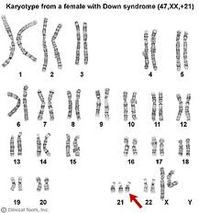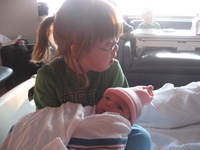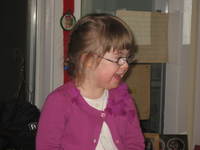There’s a new test in development that diagnoses Down
syndrome without the risk of miscarriage. Instead of using amniocentesis, which
involves extracting amniotic fluid from the uterus, this test draws blood from
the mother. Since the baby’s blood comingles with the mother’s, the test looks
for a heightened presence of the 21st chromosome as a way to
indicate Down syndrome in the baby. Although at the moment the test is
prohibitively expensive, it may well become standard for pregnant women in the
future. Not only is this test administered without risk to the baby, but it is
also available early in a pregnancy.
The medical community assumes that women should know if they
are having a child with Down syndrome. Some doctors go further–they assume
women should terminate the pregnancy in this case–but many simply want to
provide as much information as possible. It may be self-protection. No doctor
wants a “wrongful birth” lawsuit on their hands. It may be compassion from having
experienced the difficulty of a diagnosis at birth.
But the question remains: why is it important, or considered
important, for a women to know if her baby has Down syndrome? Ultrasounds pick
up the vast majority of physical abnormalities–heart defects, intestinal
blockages, even shortened limbs. But ultrasounds can’t pick up intellectual
disabilities or a list of statistics that predict what might happen to a body
with an extra 21st chromosome.
A blood test won’t provide specifics about the implications
of Down syndrome either. It will simply provide a diagnosis. And at an early
stage in pregnancy, what purpose can such a diagnosis serve other than to give
the woman an opportunity to terminate the pregnancy?
In other words, parents and doctors welcome a diagnostic
test for Down syndrome early on in pregnancy because the test provides
information that can lead to abortion. But why do many parents and many doctors
assume that abortion should be considered by any woman carrying a child with
Down syndrome?
There are risks associated with any birth, but those risks increase under certain conditions. For instance, they increase with twins. And yet, when a doctor told my sister-in-law that she was having twins, he didn’t follow the news with, “And now you have a decision to make.” The information that two babies were growing in her womb wasn’t viewed as news that might prompt termination, even though my sister-in-law had no reason to think she would conceive twins, and even though twins will require more of her as a mother and increase various medical risks–for her and for them.
Why is the news of unexpected twins considered a happy surprise (even given health risks and greater work for parents) and why is Down syndrome considered an occasion for grief, whether or not the mother decides to terminate the pregnancy?
I think the difference comes down to two issues. One, the cultural narrative surrounding twins is positive–unexpected, overwhelming, but happy. The cultural narrative surrounding Down syndrome, particularly within the medical community, is largely negative–it generally involves a list of clinical descriptions of problems without any corresponding
reason to hope for a good life for the child.
But my hunch is that the second reason mothers, fathers, and doctors fear a diagnosis of Down syndrome has to do with IQ. Many of the physical problems associated with Downs have been addressed through medical advances and Early Intervention. But as the recent brouhaha over Amy Chua’s essay in the Wall Street Journal attests, parents in America worry that their kids won’t measure up, won’t get good enough grades, won’t “succeed.”
It’s true. Individuals with Down syndrome rarely “succeed” by conventional standards. Many face challenges living independently. Many have trouble articulating or understanding abstract thoughts. And yet those same individuals generally enjoy their lives, love their families, and bring simple joy to those around them.
So a new diagnostic test promises to identify more and more babies with Down syndrome in utero, and to do so early on and without risk to the baby. I can only hope that the mothers who choose this test (and others like it) will choose it in the context not only of medical information and risk factors but also stories of individuals and families who see their children, friends, relatives with Down syndrome as a gift. A diagnosis of Down syndrome brings with it risk and fear. And it brings with it a chance to see the world through the lens of human love and grace instead of a ladder of success.


